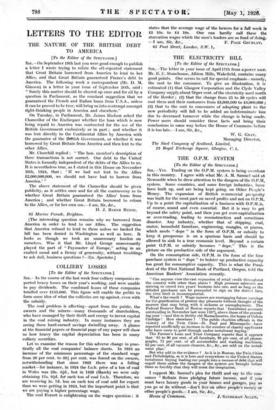THE O.P.M. SYSTEM [To the Editor of the SPECTATOR.] SIR,—Yes.
Trading on the O.P.M. system is being overdone in this country. I agree with what Mr: A. M. Samuel said at Newcastle when he drew attention to the dangers of the OP.M. system. Sonic countries, and some' foreign industries, have been built up, and are being kept going, on Other People's Money. The expansion of British ecnunercial prc sperity was built for the most part on saved profits and not on O.P.M. Up to a point the capitalization of a* business with 0:P.M. is, of course, sound and even essential: • But it is easy to get beyond the safety point, 'and then you get over-capitalization or over-trading, leading to reconstruction and sometimes disaster. 'Any industry, whether that of • shipping, coal, motor, household furniture, engineering, mangles, or pianos, which needs " dope " in the form of O.P.M. or subsidy to keep it prosperous is on a spurious basis and should be allowed -to sink to a true economic level. Beyond a certain point O.P.M. or subsidy becomes " dope." This is the picture on the productive side of the argument.
On the consumption side, O.P.M. in the form of the hire purchase system is " dope " to bolster up productive"Capacity too great for consumptive capacity. This is what the Presi- dent of the First National Bank of Portland, Oregon, told the American Bankers' Association recently.
" Can anyone view the vast expansion of retail credit throughout the country with other than alarm ? High pressure salesmen are striving to crowd two years'. business into one, and so long as the deluded purchaser can be persuaded to sign on the dotted line, the time limit is inconsequential. -
What's the result ? Wage earners are mortgaging future earnings for the gratification of present day pleasures without thought of the morrow that may bring with it sickness or unemployment. The Federal Reserve Bank of Boston reports that ' Instalment accounts outstanding in November last were 110% above those of the preced- ing year '.—and this in thrifty old Massachusetts, the home of Calvin Coolidge How elsewhere ? The public charities officials in the vicinity of the Twin Cities—St. Paul and Minneapolis—have reported unofficially an increase in the number of charity applicants who have come to grief through undue instalment buying.'
The Farmer's Loan and Trust Company reports that it appears that 85 to 90 per cent. of all furniture, 80 per cent. of all phontr- graphs, 75 per cent. of all automobiles and washing machinee 65 per cent. of all vacuum cleaners, &c., &c., are sold on the instal- ment plan.
But why add to the evidence ? As it is in Boston; the Twin Cities and Philadelphia, so it is here and everywhere in the 'United States, instalment buying leading our people into a morass of debt that will engulf them unless the dangers of the system are brought before them so forcibly that they will resist the temptation.
I support Mr. Samuel's plea for thrift and say to the con- sumer " Refrain from pledging future income, and if yon must have luxury gOods in your houses and garages, pay as you go or do without—don't live on other people's money or other people's goods.H-I am, Sir, &c,
HOU3C of COMffi0718. ' SAKDEMAii ALLEN.














































 Previous page
Previous page